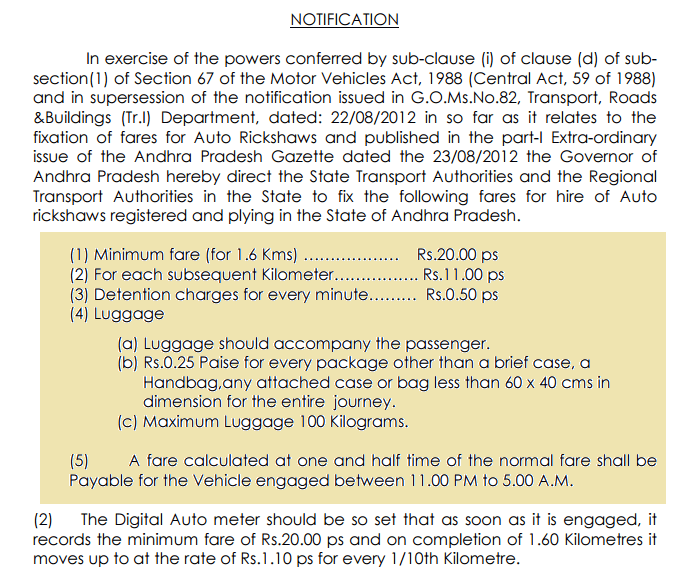[orc]Greater citizen engagement in governance is possible only when a large section of the common public is aware of the basic government laws & rules. Unfortunately, because of their complexity, these laws & rules do not appeal to the common man. At Factly, we are trying to simplify these laws/rules and present some of the important sections of these laws that are relevant to the common man on a daily basis.
Often times, common people do not know/understand government laws & rules. There could be multiple reasons for this lack of awareness, like complexity of rules etc. At Factly, we are trying to unravel complex laws and present them in a manner that a common man can easily understand. In this piece, we look at laws governing Auto & Taxi fares and who decides these fares.
How are Auto Rickshaws & Taxis classified?
Auto Rickshaws & Taxis are governed by the Motor Vehicles Act of 1988 (MV Act). This act might soon be replaced by a new ‘Road Transport & Safety Act’. But till then, it is the MV act that we need to be aware of.
Every owner whose vehicle is used as a ‘transport vehicle’ (passengers or goods) should obtain a permit from the Regional or State Transport Authority as per Sec 66 of the MV Act. In case a permit is not obtained and the vehicle is used as a transport vehicle, then both the owner and the driver could be punished under Section 192A of the MV Act. If there is a fleet of vehicles like Radio Cabs, Meru etc, they also have to obtain a permit.
The State Governments are given powers under Section 67 of the MV Act to control road transport and hence these ‘transport vehicles’ also controlled by the respective state government. This power is granted to the state governments for a variety of reasons like co-ordinating rail & road transport, prevent deterioration of the road system and also prevent uneconomic competition among permit holders of transport vehicles.
Who then decides the fares?
Under Section 67(1)(d)(i) of the MV Act, the State governments from time to time may issue directions to the State Transport Authority & the Regional Transport Authority (RTA) regarding fares & freights. The government through an order has to define maximum fare, minimum etc. The ‘transport vehicles’ with permits from the state government are classified as stage carriers, contract carriers and goods carriages based on their mode of use.
The state governments from time to time revise fares based on various factors such as inflation, fuel price, demands from various quarters etc. The government notifies different fares for different types of vehicles like Auto Rickshaws, Taxis, Radio Cabs etc. For example, here is a snapshot of the notification issued by the Government of Andhra Pradesh in 2014 revising Auto Rickshaw fares. All State Governments follow a similar procedure.
What about overcharging & refusing to carry passengers?
Section 84(c) of the MV Act requires the permit holders to charge fares as fixed by the State Governments. If the permit holder breaches this condition or for that matter any of the conditions in Section 84 of the MV Act, their permit can be cancelled or suspended by the RTA. You could make a complaint to the relevant RTA if you find anyone overcharging.
Lot of passengers complain that Auto Rickshaw & Taxi Drivers refuse to carry passengers. This is also a violation of the MV Act. Section 74(2)(xii) of the act says that except in circumstances of exceptional nature, the owner/driver shall not refuse to carry passengers. Though exceptional nature has not been expressly defined in the act, one can approach the RTA if any Auto Rickshaw or a Taxi refuses to carry.
What about Uber, Ola etc?
Unfortunately, the MV Act 1988 does not define intermediaries like Uber, Ola who are only aggregators, in the sense that they do not own any vehicle but only provide a platform for drivers. Hence various state governments could not take any action on them under MV Act, rather they blocked these websites using the provisions of the IT act. The new road transport & safety bill draft does define these ‘digital intermediaries’







